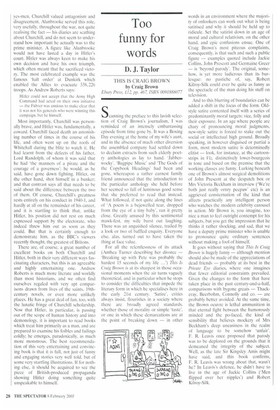Too funny for words
D. J. Taylor
THIS IS CRAIG BROWN by Craig Brown
Ebtay Press, £12, pp. 467, ISBN 0091888077 canning the preface to this lavish selection of Craig Brown's journalism, I was reminded of an intensely embarrassing episode from time gone by. It was a Boxing Day evening at the home of my wife's aunt, and in the absence of much other diversion the assembled company had settled down to declaim extracts from such elderly poetry anthologies as lay to hand. 'Jabberwocky', 'Bagpipe Music' and The Gods of the Copybook Headings' had been and gone, whereupon a rather earnest family friend announced that the introduction to the particular anthology she held before her seemed so full of luminous good sense that she preferred to read that instead. What followed, if not quite along the lines of 'A poem is a bejewelled tear, dropped from the eye of a tiny baby', ran it pretty close. Greatly amused by this sentimental mawk-fest, my wife burst out laughing. There was an anguished silence, trailed by a look or two of baffled enquiry. Everyone else, alas, turned out to have taken the thing at face value.
For all the relentlessness of its attack (Anthea Turner describing her divorce — 'Breaking up with Pete was probably the hardest 15 seconds of my life ...') This Is Craig Brown is at its sharpest in those occasional moments when the air turns vaguely theoretical, and in particular when he stops to consider the difficulties that impede the literary form in which he specialises here in the early 21st century. 'Satire', critics always insist, flourishes in a society where there are broadly agreed standards, whether those of morality or simple 'taste', or one in which these demarcations are at the point of breaking down — in other words in an environment where the majority of onlookers can work out what is being satirised and why it should be held up to ridicule. Set the satirist down in an age of moral and cultural relativism, on the other hand, and epic confusions ensue. One of Craig Brown's most piteous complaints, consequently, is that such and such a public figure — examples quoted include Jackie Collins, John Prescott and Germaine Greer — is 'beyond parody'. The original, somehow, is yet more ludicrous than its burlesque: no pastiche of, say, Robert Kilroy-Silk could ever be quite as funny as the spectacle of the man doing his stuff on television.
And to this blurring of boundaries can be added a shift in the focus of the form. Oldstyle satire contented itself with a series of predominantly moral targets: vice, folly and their exposure. In an age where people are chary of pronouncing moral judgments, new-style satire is forced to stake out the social or intellectual high ground. Broadly speaking, in however disguised or partial a form, most modern satire is determinedly elitist — look, for instance, at the cartoonstrips in Viz, distinctively lower-bourgeois in tone and based on the premise that the working classes are funny. Lurking beneath one of Brown's almost surgical demolitions of John Prescott at the despatch box or Mrs Victoria Beckham in interview ('We're both just really ornry peepaw' etc) is an aggrieved consternation of the kind that affects practically any intelligent person who watches the modern celebrity carousel in action. Mr Brown is, you imagine, too nice a man to feel outright contempt for his subjects, but you get the impression that he thinks it rather shocking, and sad, that we have a deputy prime minister who is unable to pronounce quite ordinary sentences without making a fool of himself.
It goes without saying that This Is Craig Brown is hugely funny — although mention should also be made of the appreciations of dead friends — probably at its best in the Private Eye diaries, where one imagines that fewer editorial constraints prevailed. Given the changes to the form that have taken place in the past century-and-a-half, comparisons with bygone greats — Thackeray, Beerbohm, Connolly and co. — are probably better avoided. At the same time, the Brown oeuvre is lethal ammunition in that eternal fight between the humorously minded and the po-faced, the kind of sensibility that believes mockery of Mrs Beckham's deep uneasiness in the realm of language to be somehow 'unfair'. F. R. Leavis once proposed that parody was to be deplored on the grounds that it demeaned the integrity of the subject. Well, as the late Sir Kingsley Amis might have said, and this book confirms, F. R. Leavis was wrong about that, wasn't he? In Leavis's defence, he didn't have to live in the age of Jackie Collins ('Men flipped over her nipples') and Robert Kilroy-Silk.


























































 Previous page
Previous page